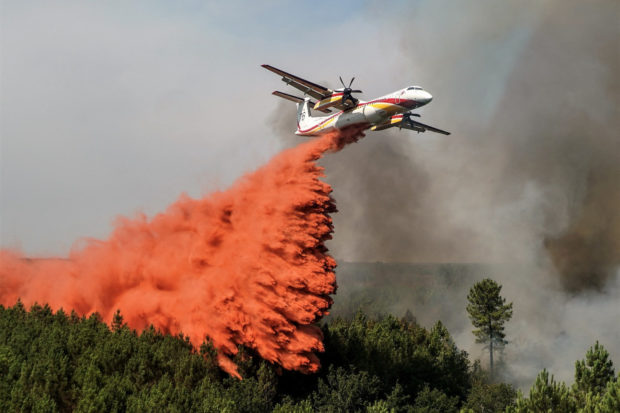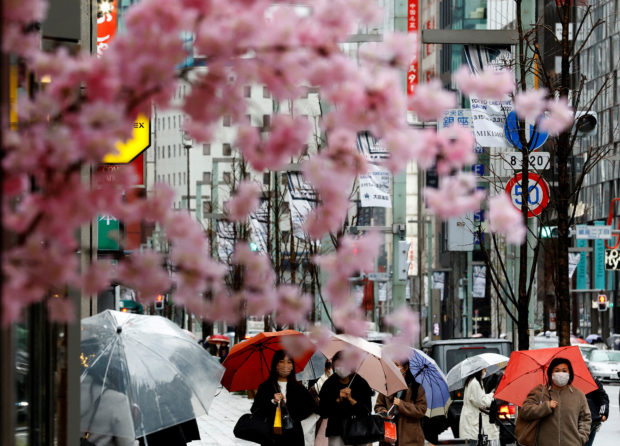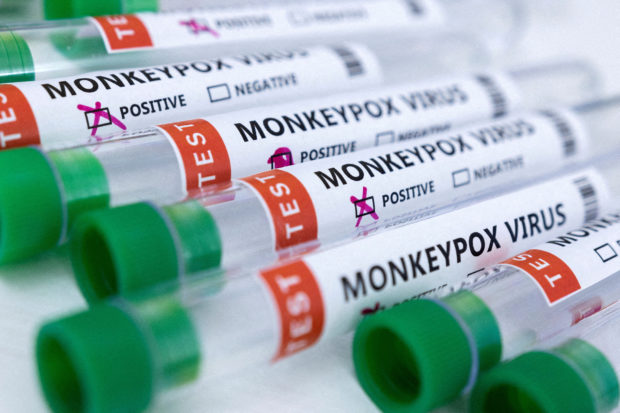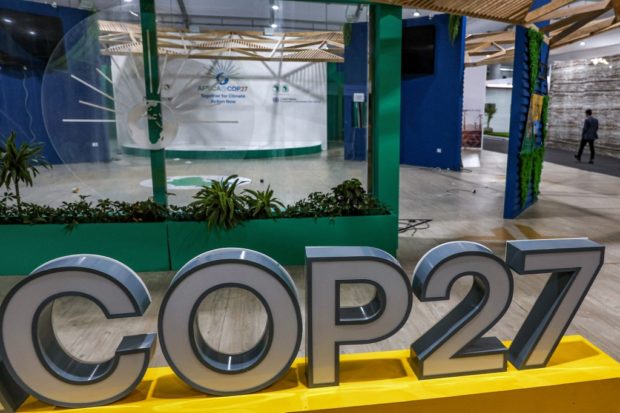2022: A year of continued struggles and a glimmer of hope

A firefighting aircraft drops flame retardant to extinguish a wildfire near Hostens, as wildfires continue to spread in the Gironde region of southwestern France, in this handout photograph released on August 12, 2022. Courtesy SDIS 33/Handout via REUTERS
From raging volcanoes and other natural disasters to exciting space exploration developments and the deaths of prominent personalities, the year 2022 was nothing short of uneventful. Just like any other year in the past, it was also full of events that shocked, scared, angered, and gave hope to citizens of the world. While it’s true that it seemed to have been dominated by not-so-pleasant news, there are still milestones that are worth celebrating. Here are INQUIRER.net’s picks for the most impactful world news of the year:

Pedestrians wearing protective face masks, amid the coronavirus disease (COVID-19) pandemic, are seen behind artificial cherry blossom decorations at a shopping district on the first day after the lifting of COVID-19 restrictions imposed on Tokyo and 17 other prefectures, in Tokyo, Japan, March 22, 2022. REUTERS FILE PHOTO
Year 3 of COVID-19
Despite the emergence of different coronavirus strains and sub variants, it was this year that many countries in the world relaxed COVID-19 measures and opened up businesses and international travel again. In September, US President Joe Biden declared that the coronavirus pandemic was over.
“We still have a problem with COVID. We’re still doing a lotta work on it. But the pandemic is over,” he had said in a TV interview.
While the World Health Organization (WHO) seemed to have sung the same tune as the president of the United States and said that the end of the pandemic was indeed “in sight”, it insisted in October that COVID-19 was still a global emergency, almost three years after it was declared as one.
In China, where the coronavirus was first detected in 2019, millions of people had to endure hard lockdowns due to the government’s zero-COVID policy. It has sparked a rare nationwide protest, which analysts said was the strongest public defiance in President Xi Jinping’s 10-year political career.
As of end-November, according to worldometers.info, nearly 650 million coronavirus cases have been reported worldwide with over 6.6 million deaths and over 624 million recoveries.

Russian honour guards attend the changing of guards ceremony at the Tomb of the Unknown Soldier by the Kremlin Wall in downtown Moscow on February 24, 2022. Russian President announced a military operation in Ukraine on February 24, 2022, with explosions heard soon after across the country and its foreign minister warning a “full-scale invasion” was underway. AFP FILE PHOTO
Russia-Ukraine war
February 24 was the day that the West warned the world about. This is the day that Russia launched an offensive against Ukraine, a move that it called a “special military operation.” Millions of Ukrainians were driven out of their country to flee the war, resulting in Europe’s largest refugee crisis since World War II.
Barely a month into the assault, Russian President Vladimir Putin in March laid out his conditions for ending the invasion.
According to the Kremlin: “Putin stressed that a settlement is possible only if Russia’s legitimate security interests are unconditionally taken into account, including the recognition of Russian sovereignty over Crimea, the demilitarization and denazification of the Ukrainian state and ensuring its neutral status.”
These conditions were defied by Ukrainian President Volodymyr Zelensky who had said that his country’s territorial integrity cannot be negotiated.
Ten months and tens of thousands of military and civilian deaths on both sides later, the war was still ongoing despite massive and unprecedented diplomatic and economic sanctions imposed by the West on Russia. Moscow has since launched a military call up, which sparked a major exodus among Russian men who may be asked to join the war. It has also since annexed four Ukrainian territories.
Now the question of many is: How long will the Russia-Ukraine conflict last? The US had warned that Putin was prepared for a long war while Nato chief Jens Stoltenberg had said that it could last for years. Meanwhile, Zelesnky had made a vow to fight to the end until they are able to “drive Russia from all of Ukraine.”

The funeral of Her Majesty Queen Elizabeth II in Westminster Abbey. 19 September 2022. Jack Hill/Pool via REUTERS
Queen Elizabeth II’s death
Queen Elizabeth II, the beloved figurehead and longest-reigning monarch of Great Britain, passed on at the ripe age of 96 on September 8 at her Balmoral home in Scotland. She died peacefully surrounded by members of the Royal family.
Charles, 73, the queen’s eldest son, automatically became the King and the head of state of 14 other realms including Australia and Canada. Camilla, Charles’ wife, who received the queen’s blessing months before her death, became the Queen Consort.
Queen Elizabeth was laid to rest in London on September 19 after 10 days of national mourning and a state funeral of unrivaled pageantry that was attended by leaders and monarchs from the world over.
King Charles and Queen Consort Camilla will be crowned on May 6 at Westminster Abbey. William, the king’s eldest son, is the new heir to the British throne.

Test tubes labeled “Monkeypox virus positive” are seen in this illustration taken May 23, 2022. REUTERS FILE PHOTO
The threat of monkeypox
Just when the world is slowly emerging from two years of lockdowns and extreme social distancing measures due to the coronavirus disease, another virus began threatening nations of the world sometime in May. Monkeypox, a rare disease which has symptoms similar to that of smallpox, started to affect a certain group of people: men who have sex with men. It spreads through close contact and tends to cause flu-like symptoms and pus-filled skin lesions among its sufferers, according to WHO.
This disease, however, is not new. It was first detected in 1958 among lab monkeys and in 1970, the first human case of monkeypox was recorded in the DR Congo. It has been endemic mostly in Central and West Africa until an outbreak in the US was reported in 2003.
The seemingly fast spread of the disease in other parts of the world such as Asia, Australia, Europe and the Americas in the middle of the year caused an alarm worldwide. In July, the WHO declared monkeypox as a “public health emergency of international concern.” It prompted health experts and affected nations to come together to help contain the disease.
In August, several countries started vaccinating their citizens against monkeypox. Bavarian Nordic’s Jynneos was given emergency authorization by the US FDA following the WHO’s declaration of public health emergency.
As of end-November, over 81,000 confirmed cases have been reported globally, with the majority of them coming from non-endemic countries.
In a most recent development, the WHO has renamed monkeypox into “MPOX” in an attempt to destigmatize the disease.

A person walks near the COP27 climate conference at the deserted hall at the Sharm el-Sheikh International Convention Centre, in Egypt’s Red Sea resort city of the same name near the end of the climate conference on November 19, 2022. AFP FILE PHOTO
More climate troubles
Extreme weather killed thousands, displaced millions, and cost billions in damages this year. If people keep on hearing that natural disasters such as floods and wildfires are getting worse every year, it’s probably because they really are.
Jacobabad in Pakistan was the hottest city on earth at one point in May with brutal temperatures topping 50 degrees Celsius. A few months later in September, it was submerged in water due to flooding.
Europe had recorded unprecedented heat while Australia had suffered rainfall and floods never experienced before. As of end-October, almost 60,000 fires in the US have burned a total of 7,211,472 acres, according to the National Interagency Fire Center. This is above the recorded 10 year average.
The United Nations Framework for Climate Change (UNFCC) and the World Meteorological Organization (WMO) have reported that the world was failing to meet its goal to limit global warming to 1.5 degrees Celsius, and that it could only spell an accelerating climate disaster.
At the recently concluded COP 27 climate summit in Egypt, parties decided to establish a “loss and damage” fund to assist vulnerable countries in coping with the devastating impacts of climate change.
While this undertaking drew praises from some, there was also anger and disappointment over a failure to advance efforts on reducing greenhouse gas emissions.
RELATED STORIES
2022: a year of living dangerously
Armageddon to wet lettuce: The phrases that defined 2022
Records that tumbled in 2022
For more news about the novel coronavirus click here.
What you need to know about Coronavirus.
For more information on COVID-19, call the DOH Hotline: (02) 86517800 local 1149/1150.
The Inquirer Foundation supports our healthcare frontliners and is still accepting cash donations to be deposited at Banco de Oro (BDO) current account #007960018860 or donate through PayMaya using this link.